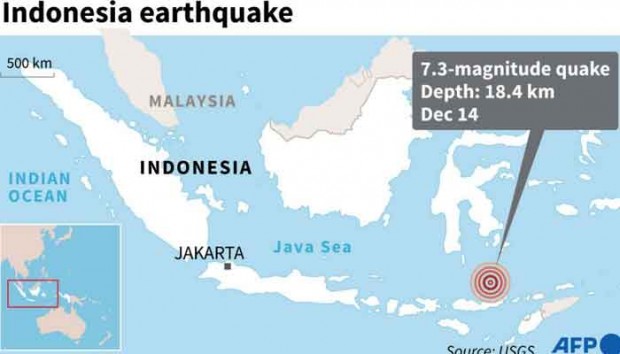Tsunami fears jolt Indonesia with 7.3-magnitude earthquake
A 7.3-magnitude struck Indonesia Tuesday, with monitors briefly issuing a warning of the possibility of hazardous tsunami waves.
However, the threat was later lifted.
The epicentre was north of the island of Flores in Indonesia’s East Nusa Tenggara province, where the quake sparked terror after hitting in the late morning (0320 GMT).
“I was in the field. People ran in panic. I am still… scared,” said Nuraini, a resident of Adonara island in the East Flores regency.
No significant damage or deaths were immediately reported from the areas where the quake was felt, but authorities urged caution.
“In the locations closest to the epicentre… It’s still safe there, there has been no damage,” East Flores district head Antonius Hubertus Gege Hadjon told Metro TV.
But “when the earthquake happened, everybody fled their homes.”
Indonesian authorities have urged residents of affected areas to not panic but seek a safe location away from the shore.
“I was checking my phone when the quake hit. I felt it for 30 seconds. It was strong,” said Alwan, a resident of Buton in Southeast Sulawesi — one of the areas where a tsunami warning was issued.
The quake struck in the Flores Sea at a depth of 18.5 kilometres (11 miles), the USGS said, detecting the epicentre around 100 kilometres north of the town of Maumere.
The Pacific Tsunami Warning Center said the quake no longer posed a threat of tsunamis after earlier warning that such waves were possible within a 1,000 km radius of the epicentre.
Indonesia experiences frequent quakes and volcanic eruptions due to its position on the Pacific “Ring of Fire”, an arc of intense seismic activity where tectonic plates collide that stretches from Japan through Southeast Asia and across the Pacific basin.
Among Indonesia’s string of deadly quakes was a devastating 2004 9.1-magnitude tremor that struck off the coast of Sumatra and triggered a tsunami that killed 220,000 throughout the region, including about 170,000 in Indonesia.
The Boxing Day disaster was one of the deadliest natural disasters in recorded history.
In 2018, a powerful quake shook the island of Lombok and several more tremors followed over the next couple of weeks, killing more than 550 people on the holiday island and neighbouring Sumbawa.
Later that year, a 7.5-magnitude quake and a subsequent tsunami in Palu on Sulawesi island left more than 4,300 people dead or missing.

